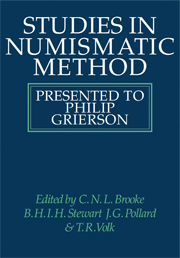Book contents
- Frontmatter
- Contents
- Acknowledgements
- Abbreviations
- Philip Grierson's contribution to numismatics
- A bibliography of the writings of Philip Grierson
- Introduction
- 1 Thoughts on the beginnings of coinage
- 2 The life of obverse dies in the Hellenistic period
- 3 Roman coinage of the Cyrenaica, first century bc to first century ad
- 4 Roman imperial coin types and the formation of public opinion
- 5 Coin hoards and Roman coinage of the third century AD
- 6 Belgian finds of late fourth-century Roman bronze
- 7 The re-use of obsolete coins: the case of Roman imperial bronzes revived in the late fifth century
- 8 Interpreting the alloy of the Merovingian silver coinagae
- 9 Carolingian gold coins from the Ilanz hoard
- 10 The novi denarii and forgery in the ninth century
- 11 On the rejection of good coin in Carolingian Europe
- 12 Ælfred the Great's abandonment of the concept of periodic recoinage
- 13 King or Queen? An eleventh-century pfennig of Duisburg
- 14 Personal names on Norman coins of the eleventh century: an hypothesis
- 15 The Gornoslav hoard, the Emperor Frederick I, and the Monastery of Bachkovo
- 16 Coinages of Barcelona (1209 to 1222): the documentary evidence
- 17 Finds of English medieval coins in Schleswig-Holstein
- 18 Privy-marking and the trial of the pyx
- 19 Judicial documents relating to coin forgery
- 20 Mint organisation in the Burgundian Netherlands in the fifteenth century
- 21 Coinage in Andrew Halyburton's Ledger
- 22 Imitation in later medieval coinage: the influence of Scottish types abroad
- 23 Barter in fifteenth-century Genoa
- Index
11 - On the rejection of good coin in Carolingian Europe
Published online by Cambridge University Press: 05 May 2010
- Frontmatter
- Contents
- Acknowledgements
- Abbreviations
- Philip Grierson's contribution to numismatics
- A bibliography of the writings of Philip Grierson
- Introduction
- 1 Thoughts on the beginnings of coinage
- 2 The life of obverse dies in the Hellenistic period
- 3 Roman coinage of the Cyrenaica, first century bc to first century ad
- 4 Roman imperial coin types and the formation of public opinion
- 5 Coin hoards and Roman coinage of the third century AD
- 6 Belgian finds of late fourth-century Roman bronze
- 7 The re-use of obsolete coins: the case of Roman imperial bronzes revived in the late fifth century
- 8 Interpreting the alloy of the Merovingian silver coinagae
- 9 Carolingian gold coins from the Ilanz hoard
- 10 The novi denarii and forgery in the ninth century
- 11 On the rejection of good coin in Carolingian Europe
- 12 Ælfred the Great's abandonment of the concept of periodic recoinage
- 13 King or Queen? An eleventh-century pfennig of Duisburg
- 14 Personal names on Norman coins of the eleventh century: an hypothesis
- 15 The Gornoslav hoard, the Emperor Frederick I, and the Monastery of Bachkovo
- 16 Coinages of Barcelona (1209 to 1222): the documentary evidence
- 17 Finds of English medieval coins in Schleswig-Holstein
- 18 Privy-marking and the trial of the pyx
- 19 Judicial documents relating to coin forgery
- 20 Mint organisation in the Burgundian Netherlands in the fifteenth century
- 21 Coinage in Andrew Halyburton's Ledger
- 22 Imitation in later medieval coinage: the influence of Scottish types abroad
- 23 Barter in fifteenth-century Genoa
- Index
Summary
Ut nullus audeat denarium merum et bene pensantem reiectare
Scholars have been aware for quite some time of the repeated provisions in Carolingian capitularies against those who refuse to accept deniers (denarii) bearing the name of the ruler. This in itself would not merit particular attention, since people quite often show little confidence in the coinage of their own country (not infrequently for good reason), but for the fact that the refused coins were of good metal and were full weight.
We know that the first time a king took such a step in defence of his own coin was in 794, i.e. shortly after Charlemagne's famous monetary reform, by which light deniers based on the Roman pound were replaced by heavy deniers struck to the new Carolingian pound. At the synod of Frankfurt-am-Main, Charlemagne decreed as follows:
De denariis autem certissime sciatis nostrum edictum, quod in omni loco, in omni civitate et in omni empturio similiter vadant isti novi denarii et accipiantur ab omnibus. Si autem nominis nostri nomisma habent et mero sunt argento, pleniter pensantes, si quis contradicit eos in ullo loco in aliquo negotio emptionis vel venditionis: si ingenuus est homo, quindecim solidos componat ad opus regis…
We learn from the Capitulare missorum, issued fifteen years later in 809, that to refuse good coin was again prohibited: De monetis statutum est ut nullus audeat denarium merum et bene pensantem reiectare.
- Type
- Chapter
- Information
- Studies in Numismatic MethodPresented to Philip Grierson, pp. 147 - 152Publisher: Cambridge University PressPrint publication year: 1983
- 1
- Cited by



